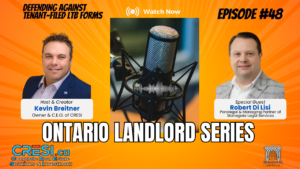Nobody likes thinking about tenant mortality, but it’s a reality every Ontario landlord needs to be prepared for. Recently on our Ontario Landlord Series podcast, we sat down with real estate lawyer Gibrian Malicki-Sanchez to tackle this sensitive topic. His insights from handling countless landlord-tenant cases across the Greater Toronto Area revealed critical steps property owners need to take – and costly mistakes to avoid.
Did you know you only have 30 days to handle a deceased tenant’s property correctly? Or that letting the wrong family member into the unit could create serious legal headaches? Our in-depth conversation uncovers the exact steps Oakville and GTA landlords need to take to protect themselves while respecting grieving families.
What To Do When a Tenant Dies in Ontario: First Steps for Landlords
The first 24 hours after discovering a tenant has passed away are crucial. Ontario law sets specific requirements for landlords, and following them carefully protects both you and the deceased tenant’s family. Here’s your immediate action plan:
- Contact police if you discover the deceased
- Secure the rental unit promptly
- Change locks to prevent unauthorized entry
- Document everything with photos
- Start a detailed inventory list
Remember: Ontario landlords must treat this situation with utmost respect while protecting everyone’s interests.
Ontario Landlord Responsibilities After Tenant Death: The 30-Day Timeline
When a tenant dies in Ontario, Section 91 of the Residential Tenancies Act automatically terminates the lease after 30 days. But what happens during those 30 days? Here’s what Mississauga and GTA landlords need to know:
- You’re responsible for securing all tenant property
- Must provide access to authorized estate representatives
- Required to remove any unsafe or unhygienic items
- Need to maintain detailed access logs
- Should photograph and document everything
This 30-day period is critical for Ontario landlords to handle things properly and avoid future complications.
Tenant Death in Ontario Rental Property: Special Circumstances
Sometimes, a tenant’s death creates complex situations that Ontario landlords need to navigate carefully. Here are some common scenarios we see in the Greater Toronto Area:
Unauthorized Occupants After Tenant Death
If someone was living in the unit but wasn’t on the lease, they typically need to leave – with one key exception. Under Ontario tenant death laws, only a spouse (married or common-law) has automatic rights to continue the tenancy.
Deceased Tenant’s Pets in Ontario
Found yourself responsible for a deceased tenant’s pet? Ontario law considers pets as property, but they need immediate care. Local resources like the Mississauga Humane Society can provide temporary solutions while you work with the estate.
Legal Requirements When an Ontario Tenant Dies: Protecting Your Rights
Smart Greater Toronto Area landlords protect themselves by:
- Maintaining thorough photo and written documentation
- Using proper property release forms
- Getting signed indemnity agreements
- Keeping all communications in writing
- Recording all financial transactions
When to Get Professional Help After a Tenant Death
While these guidelines cover the basics, unique situations may require expert help. Consider professional guidance when dealing with:
- Family disputes over property
- High-value items in the unit
- Unclear next of kin
- Complicated estate matters
Resources for Landlords Dealing with Tenant Death
Want to understand more about what happens when a tenant dies in Ontario? Our recent podcast episode features legal expert Gibrian Malicki-Sanchez diving deep into real scenarios GTA landlords have faced. He shares crucial insights you won’t want to miss about handling tenant death situations properly.
Need hands-on help managing your Ontario rental property? CRESI Property Management in Mississauga specializes in guiding landlords through complex situations like tenant deaths. Our team knows local regulations inside and out, helping you avoid costly mistakes while handling sensitive matters appropriately.
Related: Stress-free tools for landlords



